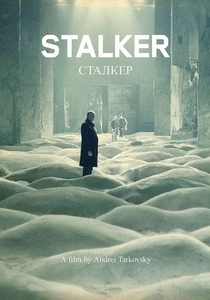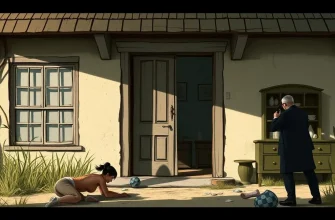Soviet cinema has always been known for its depth and exploration of human psyche, often delving into themes of transformation and change. This curated list of 10 Soviet films showcases characters who undergo significant metamorphoses, whether physical, emotional, or spiritual. These films not only entertain but also provoke thought, offering a window into the complexities of human nature and the transformative power of life's experiences. Each film in this collection has been selected for its unique portrayal of change, making it a must-watch for anyone interested in the art of storytelling through cinema.

Stalker (1979)
Description: In this philosophical science fiction film, a guide known as the Stalker leads two men into the mysterious "Zone," where their deepest desires can be granted, leading to profound personal changes.
Fact: The film was shot in Estonia, and the Zone was created using industrial landscapes. It was banned in the Soviet Union for a time due to its perceived criticism of the government.
 Watch Now
Watch Now 
The Irony of Fate (1975)
Description: This romantic comedy-drama features a man who, after a night of drinking, ends up in Leningrad instead of Moscow, leading to a series of life-changing events. The film explores themes of identity, love, and the unexpected twists of fate.
Fact: The film was shot in both Moscow and Leningrad, with the crew having to recreate the same apartment in both cities. It has become a New Year's tradition in Russia, often watched on December
 30 Days Free
30 Days Free 
The Mirror (1975)
Description: Directed by Andrei Tarkovsky, this film is a semi-autobiographical exploration of a man's life, blending memories, dreams, and reality. It's a profound study of personal transformation through time and memory.
Fact: Tarkovsky used his own childhood memories for the film, and it was his most personal project. The film was initially met with mixed reviews but has since been recognized as a masterpiece of world cinema.
 30 Days Free
30 Days Free 
The Ascent (1977)
Description: Set during World War II, this film follows two Soviet partisans on a mission that leads to a moral and physical transformation, exploring themes of sacrifice and redemption.
Fact: The film won the Golden Bear at the Berlin International Film Festival, making it one of the most acclaimed Soviet war films.
 30 Days Free
30 Days Free 
The Cranes Are Flying (1957)
Description: This poignant war drama tells the story of a young woman whose life is transformed by the war, leading her through love, loss, and personal growth.
Fact: It was the first Soviet film to win the Palme d'Or at the Cannes Film Festival, highlighting its international acclaim.
 30 Days Free
30 Days Free 
The Color of Pomegranates (1969)
Description: A visually stunning film that explores the life of the Armenian poet Sayat Nova through a series of symbolic and transformative scenes, reflecting his inner world.
Fact: The film was initially banned in the Soviet Union for its abstract style, but it has since been recognized as a landmark of avant-garde cinema.
 30 Days Free
30 Days Free 
The Lady with the Dog (1960)
Description: Based on Chekhov's story, this film depicts the transformation of a man and a woman through an illicit love affair, exploring themes of love, guilt, and personal change.
Fact: The film was shot in Yalta, the same location where Chekhov wrote the original story, adding authenticity to the adaptation.
 30 Days Free
30 Days Free 
The Ballad of a Soldier (1959)
Description: A young soldier's brief leave from the front line leads to a series of encounters that transform his understanding of life, love, and duty.
Fact: The film was one of the first Soviet films to show the human side of war, focusing on the personal rather than the political.
 30 Days Free
30 Days Free 
The Commissar (1967)
Description: A pregnant commissar is forced to stay with a Jewish family, leading to a profound transformation in her views on life, war, and humanity.
Fact: The film was banned in the Soviet Union for nearly 20 years due to its portrayal of the Jewish family, but it was eventually released and praised for its humanistic approach.
 30 Days Free
30 Days Free 
The Forty-First (1956)
Description: A sniper in the Red Army falls in love with a White Army officer she is supposed to execute, leading to a dramatic change in her perspective on war and love.
Fact: The film was based on a novel by Boris Lavrenyov and was one of the first Soviet films to explore the personal conflicts of soldiers during the Civil War.
 30 Days Free
30 Days Free 








